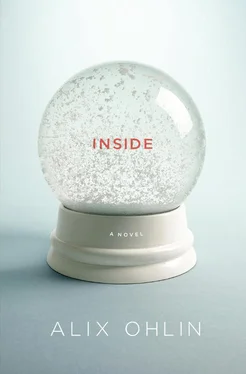They let Sarah win, and Grace read her a story, and then the two of them helped her change into her pajamas. Mitch took her into the bathroom and helped her brush her teeth, gently guiding the toothbrush around her small mouth, afraid of hurting her. She bared all her teeth in the mirror, a crazy person’s smile, and said, “All clean.”
She climbed into bed, muttering some story, her room dark except for the blue glow of the nightlight. She was whispering herself to sleep, casting a spell, and didn’t seem to notice when he left.
Back in the living room, Grace was sitting on the couch. As he walked in, she examined him so openly, so curiously, that he felt self-conscious. “My friends think you’re a saint,” she said. “They say no other guy would do what you’re doing.”
He shrugged, blushing a little.
“I said you’re just feeling guilty about something,” she went on. “So what is it?”
This was Grace all over. She didn’t let you get away with anything. He shrugged again. “I let people down,” he said.
“Do you want to talk about it?”
“No.”
“Would you like a glass of wine? I think there’s a bottle of Bordeaux in the cupboard.”
Mitch was touched by this. When they were married he drank Bordeaux almost exclusively, the most expensive he could afford, afraid of seeming unsophisticated. These days he drank whatever was offered or on hand. In the kitchen, he uncorked the bottle and poured himself a glass, then went back to the living room and sat down in an armchair kitty-corner to Grace. The color was back in her face, and Azra had come by the day before and helped her take a bath and wash her hair. She no longer had a wince of constant pain. She raised her mug of tea in a toast.
“You’re looking a lot better,” he said.
“No I’m not,” she said firmly. “I look like forty miles of rough road. As my grandmother used to say.”
He laughed, and they sat in silence over their drinks. Without a specific task to do, being with her did feel odd; the familiarity, combined with the distance between them, set him on edge. It was like seeing yourself in a funhouse mirror, with your features distorted and your body torqued yet insistently, regrettably, your own. Only now, sitting in her living room, did he realize what a good job he’d done of burying the painful aspects of their divorce, and how violently they still pulsed beneath the layers of the intervening years.
Stymied, he said, “Why aren’t you practicing anymore?”
“Oh, I’m practicing ,” she said. It was a long-standing joke between them, so old he was surprised she even remembered it. “I’m just not very good.”
“Elementary school teacher,” Mitch said. “Tell me how that happened.”
Something flitted across her face — pain, of course, but other things too, maybe memory, even humor, in some elusive combination he couldn’t decipher. She was older and less beautiful, his ex-wife, and he wasn’t in love with her anymore; but seeing her pain was like feeling his own, because for so long he had had a part in it.
“It was the usual, I guess. Burnout.”
He didn’t believe her but didn’t think it was his right to press. “I never pegged you for that, somehow. I thought your energy was endless.”
Grace looked at him thoughtfully. “Maybe the problem was that I had too much. That I thought you can accomplish things you really can’t.”
He waited.
“I had some patients,” she said slowly, and then stopped.
“You realized you couldn’t do as much for them as you’d hoped.”
She shrugged. “I guess,” she said, tears brightening her eyes.
“But sometimes we can do too much,” he said. “We almost have too much power, don’t you think?”
She shook her head. “I think people do whatever they want, no matter what we say.”
“Maybe so,” he said.
“Anyway, so I closed my practice and went back to school and became a teacher. It works well with Sarah, too, because we have the summers together. And what about you, Mitch? You still like your job? It seems like you’re doing well, from what I hear at the hospital.”
“Oh, there’s not much to report,” he said.
Grace’s smile was tight. “Lucky you.”
Afterward he walked out into the breezy night and strolled around the neighboring park before getting back in his car. He was a little tipsy from the wine, and the cool air felt good on his face. Plenty of others — dog walkers, hacky sack players, groups of teenagers — were in the park, reluctant to give up on the long nights of summer, with fall looming dark before them.
He walked along Monkland, on a route they might’ve taken together a long time ago. People were sipping drinks on the outside terraces, laughing and chatting. The door to the Old Orchard pub was open, the high, quick notes of a Celtic fiddler embroidering the air. Then he left the bustling avenue and drifted back to the side street where he was parked, the noise dampened by the leafy trees.
The windows of Grace’s apartment were dark. Before leaving, he had asked how she thought Sarah was doing, and from the small nod that greeted the question he understood this was the first thing he should have said.
“She seems good. Her teacher says she’s doing great. I don’t know, though. I worry that she’ll be affected by seeing me like this. I feel like I should talk to her about it, but everybody says I should just let it go.”
“Is that what you’re going to do? Let it go?”
Grace met his eyes. “No,” she said.
In the lamplight her face was burnished and sallow. She looked both hopeful and sad, so much like she had when they were younger, and he drew closer to her, drawn by memory or habit or some instinct that would never die in him as long they both lived.
She put her hand on his arm. “It isn’t going to be like that,” she said firmly.
He nodded, and kissed her cheek like a brother or a friend, then arranged a blanket over her on the couch and left.
He woke up the next morning feeling better, if not about himself then about the world. Lying in bed, the phrase old flame came to him, and he considered how little it described the truth of the situation. Between him and Grace there was nothing burning, which his gesture last night had only confirmed. But there was something else, solid and enduring, that was more like old furniture , with the steady reassurance of lasting objects.
Since returning to Montreal he had sprung out of bed most mornings and gone for an hour-long run, hoping to purge his body of unwanted and disturbing thoughts. It was both discipline and penitence. But today he stayed in the apartment, drinking tea and reading the newspaper.
“Are you having a slow burn?” his mother used to say, trying for the second or third time to wake him up for school. As a special treat, every few weekends they’d have a slow-burn morning as a family, and she would let Malcolm and Mitch hang around the kitchen while she made pancakes and bacon.
His mother was an ample, competent woman who had raised them on her own. She worked as a secretary at CN Rail, and every morning after they left for school she’d take a bus downtown. Mitch could still remember the perfume she wore, and the hideous orange lipstick she seemed to consider a professional necessity. She had left school at sixteen to work in her family’s restaurant, but never expressed any sadness at having missed out. Nor did she complain about coming home after a full day’s work to cook dinner, do the laundry, help with homework. “You’re my good boys,” she’d say, tucking them into bed.
And they were. They both did well in school, and in this she said they took after their father. Mitch was five when he died. Malcolm, who was two years older, claimed to have memories of him, and at night after the lights were out, Mitch would sometimes beg to hear them; but these stories shifted and changed so much, often borrowing from whatever TV show or comic book Malcolm was into at the time, that Mitch was doubtful even as he hoped to believe them. What they knew of him was this: he’d been born in 1921, in Winnipeg, and served in the Canadian infantry during World War II. He’d become an engineer, also working at CN, met Rosemary in the family restaurant where she’d been waitressing, and whisked her off to Montreal and marriage. He was smart as a whip (another of their mother’s favorite sayings); and he died, much too young, of a heart attack, which was why they should listen to her and never, ever start smoking.
Читать дальше












